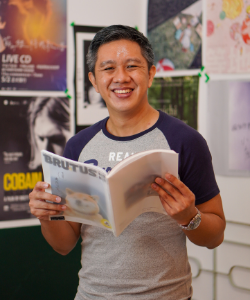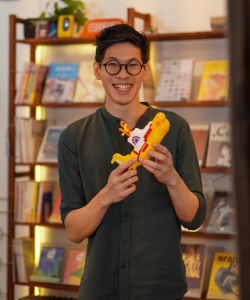Hear what our ALUMNI have to say…

Kenneth Ng
Chinese | Class of 2011
Regional Manager for Partnership & Sustainability | ENGIE Asia Pacific
People often associate SoH Chinese Programme as pathways to be either a journalist or a Chinese language teacher, which is not true. The skills which Chinese graduates are trained in, give us an edge over others in terms of coming up with solutions that are more bespoke to the current geopolitical climate. As an Asian working in the Asia Pacific region, SoH Chinese Programme empowers me to be sensitive to the culture and historical context of each country that I worked in.
Chinese | Class of 2011
Regional Manager for Partnership & Sustainability | ENGIE Asia Pacific
People often associate SoH Chinese Programme as pathways to be either a journalist or a Chinese language teacher, which is not true. The skills which Chinese graduates are trained in, give us an edge over others in terms of coming up with solutions that are more bespoke to the current geopolitical climate. As an Asian working in the Asia Pacific region, SoH Chinese Programme empowers me to be sensitive to the culture and historical context of each country that I worked in.

Charmaine Ann Thio
English | Class of 2014
SEA Regional Brand Ambassador | Hendrick's Gin
It was at NTU English that I realised the value of thinking unconventionally, that the world needs more unabashed dreamers and deviant thinkers to hold up a different lens against the world we sometimes assume we know. The thing about the English program is that it’s not about tearing apart words on a page in search of some notion of truth and meaning; it’s about discovering different cultures, history, ideologies, perspectives, philosophies, theories and sometimes a little more about yourself. It opens your mind up to things you never knew you never knew and it’s that acceptance of personal ignorance coupled with insatiable curiosity that helps you form genuine connections with people from all walks of life as you move on to build your career.
Most importantly I enjoyed my time at NTU English because I was doing something I loved even if naysayers told me my prospects were limited. I couldn’t fathom waking up every day being greeted by the thought that I was obligated to go do something I cared nothing for. After graduating I still held on to that philosophy and found myself working as a bartender for the next 4 years. Some people said I was wasting my degree, I say I was playing the long game. Today I work for one of the most successful family owned spirits companies in the world. I travel around the region speaking at cocktail conferences, trade panels and roundtables, I sit on various trade committees regionally and globally, and I help bring delightfully unusual experiences to life, all representing a brand that is proud to say that it’s “not for everyone”. The English program is definitely not for everyone and I’ll be honest, the path isn’t always clear. But, if you’re unafraid of pursuing the peculiar then go ahead, take the road less travelled and who knows where you’ll end up but oh, the places you’ll go!
English | Class of 2014
SEA Regional Brand Ambassador | Hendrick's Gin
It was at NTU English that I realised the value of thinking unconventionally, that the world needs more unabashed dreamers and deviant thinkers to hold up a different lens against the world we sometimes assume we know. The thing about the English program is that it’s not about tearing apart words on a page in search of some notion of truth and meaning; it’s about discovering different cultures, history, ideologies, perspectives, philosophies, theories and sometimes a little more about yourself. It opens your mind up to things you never knew you never knew and it’s that acceptance of personal ignorance coupled with insatiable curiosity that helps you form genuine connections with people from all walks of life as you move on to build your career.
Most importantly I enjoyed my time at NTU English because I was doing something I loved even if naysayers told me my prospects were limited. I couldn’t fathom waking up every day being greeted by the thought that I was obligated to go do something I cared nothing for. After graduating I still held on to that philosophy and found myself working as a bartender for the next 4 years. Some people said I was wasting my degree, I say I was playing the long game. Today I work for one of the most successful family owned spirits companies in the world. I travel around the region speaking at cocktail conferences, trade panels and roundtables, I sit on various trade committees regionally and globally, and I help bring delightfully unusual experiences to life, all representing a brand that is proud to say that it’s “not for everyone”. The English program is definitely not for everyone and I’ll be honest, the path isn’t always clear. But, if you’re unafraid of pursuing the peculiar then go ahead, take the road less travelled and who knows where you’ll end up but oh, the places you’ll go!

Linus Lee
History | Class of 2017
Enterprise Sales Executive | Rackspace Technology
Learnings in Humanities classes are very self-directed. Most times, you are given a research question, and you are required to be resourceful - to know where and how to find answers. It drives you to take in as much information as possible and yet at the same time make a decision to discard those that are irrelevant. The inability to do the latter would lead to analysis paralysis. But in order to do the latter, one has to focus on the research question thereby pressing you to think and write clearly and be succinct. In hindsight, I felt that humanities students have a certain mode of thinking which may not be as pronounced in students from other fields of study.
History | Class of 2017
Enterprise Sales Executive | Rackspace Technology
Learnings in Humanities classes are very self-directed. Most times, you are given a research question, and you are required to be resourceful - to know where and how to find answers. It drives you to take in as much information as possible and yet at the same time make a decision to discard those that are irrelevant. The inability to do the latter would lead to analysis paralysis. But in order to do the latter, one has to focus on the research question thereby pressing you to think and write clearly and be succinct. In hindsight, I felt that humanities students have a certain mode of thinking which may not be as pronounced in students from other fields of study.

Aloysius Ang
Linguistics and Multilingual Studies | Class of 2015
Business Development Manager | Azeus Convene
It may seem fundamental but the 3 key basic skills that I developed during my undergraduate years at SoH which has served me well over and over again are: critical thinking, research and writing. Businesses exist to solve a problem and fulfil a need or a want. So in any business development role, it is important to think critically to identify what is the problem you are solving and how to do so. And whether it is worthwhile solving in terms of dollars and cents. This process very often needs to be based on some form of research and data you’ve gathered, and of course in the real world, information is often incomplete and we will need to make a hypothesis and write up a case or a proposal for it. All of this is similar to working on a research project in the humanities. I am glad to have pick up all these critical skills yet transferable skills from my courses in humanities.
Linguistics and Multilingual Studies | Class of 2015
Business Development Manager | Azeus Convene
It may seem fundamental but the 3 key basic skills that I developed during my undergraduate years at SoH which has served me well over and over again are: critical thinking, research and writing. Businesses exist to solve a problem and fulfil a need or a want. So in any business development role, it is important to think critically to identify what is the problem you are solving and how to do so. And whether it is worthwhile solving in terms of dollars and cents. This process very often needs to be based on some form of research and data you’ve gathered, and of course in the real world, information is often incomplete and we will need to make a hypothesis and write up a case or a proposal for it. All of this is similar to working on a research project in the humanities. I am glad to have pick up all these critical skills yet transferable skills from my courses in humanities.

Siti Zulaiqah Binte Abdul Rahim
Philosophy | Class of 2018
Journalist | Berita Harian
When I went for my admission interview, I was deciding between Business and Philosophy. Not knowing what to choose, I decided to seek the interviewing professor’s advice on it. His reply was - You have the rest of your life to study Business but you only have these four years to study Philosophy. I took his advice and pursued a degree in Philosophy, a decision which I have never regretted. Philosophy gave me a chance to be curious and open-minded to things, people and ideas. A new environment maybe intimidating but I feel that if you are able to think and write well, there is nothing to be afraid of.
Philosophy | Class of 2018
Journalist | Berita Harian
When I went for my admission interview, I was deciding between Business and Philosophy. Not knowing what to choose, I decided to seek the interviewing professor’s advice on it. His reply was - You have the rest of your life to study Business but you only have these four years to study Philosophy. I took his advice and pursued a degree in Philosophy, a decision which I have never regretted. Philosophy gave me a chance to be curious and open-minded to things, people and ideas. A new environment maybe intimidating but I feel that if you are able to think and write well, there is nothing to be afraid of.

Zulhaqem Bin Zulkifli
Philosophy | Class of 2019
Currently pursuing Master of Philosophy (Buddhist Studies) | University of Oxford
I entered NTU as part of the second batch of Philosophy majors. This was met with some criticism as I could have gone to other more reputably perceived universities but still chose NTU. This turned out to be one of the best choices I had made. I will not lie – my years as a Philosophy undergraduate were difficult and at times felt impossible because of the level of advanced reading and writing skills that the programme demanded. But this is Philosophy after all, and while difficult at first, it was certainly rewarding. Being trained in Philosophy allows us to be able to express our ideas with precise clarity, and more importantly, the ability to think critically and to acquire intellectual flexibility in accommodating and considering perspectives that we do not personally subscribe to. My professors were very passionate about their field and were infectious sources of inspiration for all of us. Many of them taught me to be brave in traversing new bodies of knowledge and to not be daunted but to be someone who stood out in the fields that they study.It has certainly been of great inspiration for me personally. One does not enter Philosophy and leaves the same person, because the experience is a crucible from which one emerges polished, both in mind and in soul. Well, if you believe in a soul that is.
Philosophy | Class of 2019
Currently pursuing Master of Philosophy (Buddhist Studies) | University of Oxford
I entered NTU as part of the second batch of Philosophy majors. This was met with some criticism as I could have gone to other more reputably perceived universities but still chose NTU. This turned out to be one of the best choices I had made. I will not lie – my years as a Philosophy undergraduate were difficult and at times felt impossible because of the level of advanced reading and writing skills that the programme demanded. But this is Philosophy after all, and while difficult at first, it was certainly rewarding. Being trained in Philosophy allows us to be able to express our ideas with precise clarity, and more importantly, the ability to think critically and to acquire intellectual flexibility in accommodating and considering perspectives that we do not personally subscribe to. My professors were very passionate about their field and were infectious sources of inspiration for all of us. Many of them taught me to be brave in traversing new bodies of knowledge and to not be daunted but to be someone who stood out in the fields that they study.It has certainly been of great inspiration for me personally. One does not enter Philosophy and leaves the same person, because the experience is a crucible from which one emerges polished, both in mind and in soul. Well, if you believe in a soul that is.
